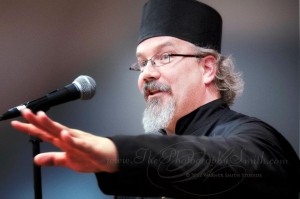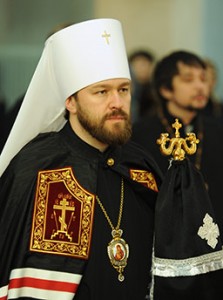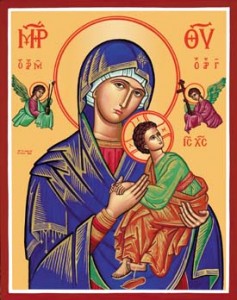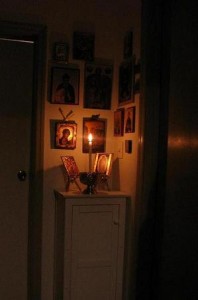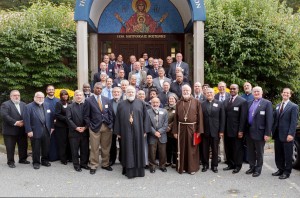But whosoever shall cause one of these little ones who believe in Me to stumble, it would be to his advantage that a millstone turned by an ass were hung upon his neck, and he were drowned in the deep of the sea (Mt. 18:6).
In the United States and many European countries as well, we are coming up to the annual festival of the celebration of “All Hallows’ Evening.” Its roots go back to ancient pagan Celtic tradition Samhain (pronounced: Sah-ween) when villagers would light large outdoor fires and put on costumes to hide from and ward off roaming ghosts of spirits and the dead. The Research Center of the Library of Congress reports:
“It was the biggest and most significant holiday of the Celtic year. The Celts believed that at the time of Samhain, more so than any other time of the year, the ghosts of the dead were able to mingle with the living.i
The Celtic region included the area that is now modern Great Britain, France and Ireland. Also part of the pagan banquet was that animals and crops were placed in the bonfires as a sacrifice to the pagan gods. The conquest of the majority of Celtic lands by the Romans in 43 AD added additional pagan elements to the feast. One was Feralia, a late October festival wherein the Romans memorialized their dead. Second, was a day to sacrifice to the Roman goddess Pomona, the goddess of fruit and trees.
Pomona’s symbol is the apple. To this day, apples are common in modern celebrations of this festival. The name of this festival has also been changed. It is no longer referred to as “All Hallows’ Evening.” All know it by the name ‘Halloween.’
The Divine Instruction regarding paganism
It should be immediately obvious that the members of the Eastern Church that then and now that make up the original Patriarchates in Africa, Eastern Europe, India and the Middle East would know nothing of this festival. Not so for the Church in the West. The Church could not stand by idly. In Old Testament Sacred Scripture we read the instructions God gave to His people through the mouth of Moses:
When thou art come into the land which the Lord thy God shall give thee, beware lest thou have a mind to imitate the abominations of those nations. Neither let there be found among you any one that shall expiate his son or daughter, making them to pass through the fire: or that consulteth soothsayers, or observeth dreams and omens, neither let there be any wizard, Nor charmer, nor any one that consulteth pythonic spirits, or fortune tellers, or that seeketh the truth from the dead. For the Lord abhorreth all these things, and for these abominations he will destroy them at thy coming. (Deut 18: 9-12)
One of the fundamental teachings of Christ about salvation is in His words to Thomas during the priestly discourse at the Last Supper: “Jesus saith to him, “I am the way, and the truth, and the life; no one cometh to the Father, except by Me.” (Jn. 14:6) The Apostles themselves would go on to adapt Christ’s teaching to the cultures and traditions they encountered as they evangelized in different parts of the world. St. Paul, for example would tell the pagan Athenians that the “unknown God” they worshiped was the God of the Christians. St Luke tells us St. Paul’s words:
“Men, Athenians, I perceive how in all things ye are most religious. “For passing through and carefully observing the objects of your veneration, I also found an altar on which it had been written: ‘To an unknown God.’ Therefore since ye know not Whom ye reverence, I proclaim this One to you. “The God Who made the world and all things in it, this same One, being Lord of heaven and of earth, dwelleth not in temples made by hand; “neither is He being serviced to by the hands of men, as though in need of anything, because He Himself giveth to all life, and breath, in all respects” (Acts 17:22-25).
In emulation of the missionary ethos of St. Paul and the Apostles, a transition from the pagan festival of Samhain to a Christian feast started in 609 AD. Boniface IV, Patriarch of the West and Pope of Rome who inaugurated a Feast called All Martyrs Day. Pope Gregory III (731-741) added all saints of the Church to the martyrs and fixed the date to 01 Nov.
Origins of the English word Halloween
The name of this feast in Middle English was Alholowmesse. Imbedded in this word is the modern word ‘hallow,’ which means holy. Thus, the meaning of the Feast is its name: the Feast of all the holy ones – all the saints. The evening before the Feast would be ‘all-hollows eve’ which in modern English becomes Halloween. The tie to the saints or souls that have fallenl asleep in the Lord, became further strengthened by the day after All-Saints Day, which in the West came to be called All-Souls’ day.
The Diaspora of the Eastern Church
In the 19th Century, immigration of Eastern Christians from the traditional areas they had long occupied into the geographic areas of the Western Church, intensified. Obviously, they did not find the Celtic pagan practices that had confronted the Church in the 7th Century, but they did find the residue of pagan practices as they have been transformed over time —-such as the modern Halloween Festival. So the question for Orthodox Christians is: how should they respond to the Halloween as it exists today?
Halloween Today
The Library of Congress Research Center [see Endnote i] beautifully summarizes current practice:
Virtually all present Halloween traditions can be traced to the ancient Celtic day of the dead. Halloween is a holiday of many mysterious customs, but each one has a history, or at least a story behind it. The wearing of costumes, for instance, and roaming from door to door demanding treats can be traced to the Celtic period and the first few centuries of the Christian era, when it was thought that the souls of the dead were out and around, along with fairies, witches, and demons. Offerings of food and drink were left out to placate them. As the centuries wore on, people began dressing like these dreadful creatures, performing antics in exchange for food and drink. This practice is called mumming, from which the practice of trick-or-treating evolved. To this day, witches, ghosts, and skeleton figures of the dead are among the favorite disguises. Halloween also retains some features that harken back to the original harvest holiday of Samhain, such as the customs of bobbing for apples and carving vegetables, as well as the fruits, nuts, and spices cider associated with the day.
Today Halloween is becoming once again and adult holiday or masquerade, like Mardi Gras. Men and women in every disguise imaginable are taking to the streets of big American cities and parading past grinningly carved, candlelit jack o’lanterns, re- enacting customs with a lengthy pedigree. Their masked antics challenge, mock, tease, and appease the dread forces of the night, of the soul, and of the otherworld that becomes our world on this night of reversible possibilities, inverted roles, and transcendency. In so doing, they are reaffirming death and its place as a part of life in an exhilarating celebration of a holy and magic evening.
How should Eastern Christians respond to modern Halloween?
The beautiful words of the commemoration of the Theotokos at the end of most of the Ektenias (Litanies) of the Church should be the ethos of our response: “… let us commend ourselves and each other, and all our life unto Christ our God.” We can take a step toward the healing of society, our families and our children by taking what is at the core of our Orthodox Faith to transform Halloween from evil and superstition to the care of Our Ever-present God who opens us to His sanctification.
To accomplish this means removing anything ungodly from the celebration. This means unhealthy focusing and emphasis on cemeteries, devils, ghouls (a grave robber, an evil spirit or ghost), goblins, (a grotesque supernatural creature that makes trouble for living people), skeletons and alternative sexual lifestyles. If any Halloween practice contains as its spirit, as the Library report above states, “antics [that] challenge, mock, tease, and appease the dread forces of the night, of the soul. . . .” then they can clearly be seen as un-Godly. Some practices not only are an affront to God but dishonor our bodies that we are to care for and the love we must have for others. For example, wearing a costume that is pornographic, that is to say arouses lust and sexual desire, surely is disrespect to ourselves and those around us.
Let me suggest a few guiding principles. Do not outright dismiss Halloween as many children become oppositional when given a stern, uncompromising, not understood, dictatorial: “No.” Ask the children what they think Halloween means. Parents may then engage their children in conversation to suggest how they want to celebrate the festival. Children could be prompted to describe what they think are the true values of God: God is love and Goodness. Then, they could be asked what they think are the values of the evil one and his spirits.
The conversation with the child can move on to the question: “Can you love God and be on His side and with celebrating the evil spirits at the same time. Whose side do you want to be on?” If a family loved one has fallen asleep in the Lord, would they want to think of them as a ghoul, spirit in league with the evil one as depicted in Halloween costumes, or to be in God’s bosom. As the Christians of the first millennium transformed the pagan festivals to Christ-centered celebrations, parents can transform pagan Halloween into Christ-like joyous Halloween.
Keep Christ in Halloween
Any Halloween practice by Eastern (or any Christians), then, should contain Christ. A few suggestions are: Harvest Festival thanking God for the fruits of the Harvest (instead of appeasing evil forces). Offer age-appropriate “treats” to neighbors when Trick or Treating: offers to rake leaves, or pick up fly-away trash.
- Icons or other Symbols placed on Pumpkins
- Carving a Christian symbol on Pumpkins, especially the Cross.
- Animal Cookies—-(Referencing the Creation narrative and the story of Noah in the Old Testament Book of Genesis, instead of sacrificing to the evil one)
- Have a parish Halloween party or play. Especially featuring martyr saints and the holy monks who struggled against demonic aggravation. Both conquered by their adherence to Christ.
- Psalm or Proverb Quotes Cards for Trick or Treaters
- Sacred Scripture, patron saint or morally neutral costumes
- Finally, let us meditate on Christ, who is the center of all things.
Who is the image of the invisible God, the firstborn of all creation. For in Him were all things created, the things in the heavens and the things upon the earth, the visible and the invisible, whether thrones, or dominions, or principalities, or authorities. All things through Him and to Him have been created. And He is before all things, and in Him all things have come into existence. (Col. 1:15-17)
i http://www.loc.gov/folklife/halloween.html
V. Rev. Fr. George Morelli Ph.D. is a licensed Clinical Psychologist and Marriage and Family Therapist.
He is the Coordinator of the Chaplaincy and Pastoral Counseling Ministry of the Antiochian Orthodox Christian Archdiocese and Religion Coordinator (and Antiochian Archdiocesan Liaison) of the Orthodox Christian Association of Medicine, Psychology and Religion.
Fr. Morelli is also Assistant Pastor of St. George’s Antiochian Orthodox Church, San Diego, California.
Source: Orthodoxy Today


